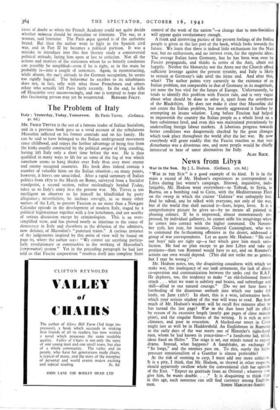News from Libya
War in the Sun. By J. L. Hodson. (Gollancz. its. 6d.)
"WAR IN THE SUN" is a good example of its kind. It is in the main a record of Mr. Hodson's experiences as correspondent in Libya during last winter's campaign. Shrewd, inquisitive, inde- fatigable, Mr. Hodson went everywhere—to Tobruk, to Syria, to Burma, on a bombing raid to Crete, with the Mediterranean Fleet on the sweep in which the cruiser 'Galatea' was unhappily lost. And he talked, and he talked with everyone, not only of the war, but of the world that shall succeed it—fears, hopes, loves. It is a comprehensive picture he gives us—by no means all painted in pleasing colours. If he is impressed, almost monotonously im- pressed, by individual gallantry, he cannot stifle his misgivings when he comes into contact with the higher command. On Novem- ber 25th, last year, for instance, General Cunningham, who was to command the forthcoming offensive in the desert, addressed a group of war correspondents. Let us quote Mr. Hodson: "He said our boys' tails are right up—a fact which gave him much satis- faction. He had no plan except to go into Libya and take up positjons—then von Rommel would have to act, and on Rorrunel's actions our own would depend. (This did not strike me as genius, but I may be wrong)" Mr. Hodson notes, too, the disquieting casualness with which we make war, the inadequacy of our tank armament, the lack of direct co-operation and communication between the tanks and the R.A.F. He deplores, too, the tendency to make "an old-fashioned frontal attack . . what we want is subtlety and brains, and subterfuge and skill—allied to our natural courage." (Do we not here have a foreboding of the disastrous ambush into which our tanks fell lately, on June 13th?) In short, this is a wise, informative book, which your serious student of the war will want to read. But how much of Mr. Hodson's wisdom will he recall five minutes after he
has turned the last page? War in the Sun loses half its effect by reason of its excessive length (nearly 400 pages of close minute
print), and the singular flatness of the writing. It is rich in anti- climaxes, and poor in evocation. A blacked-out street in Cairo might just as well be in Huddersfield. An Englishman in Rumania in the early days of the war meets one of Himmler's right-hand men, whom he had known in peace-time—" a handsome lad, titled, ideas fixed on Hitler." The stage is set, our minds tuned to expect
drama. Instead, what happens? A handshake, an exchange of "So longs," and the enemies pass on. To this, surely the high- pressure sensationalism of a Gunther is almost preferable?
At the risk of seeming to carp, I must add one more criticism. It is a pity, I think, that Mr. Hodson, so shrewd in other respects, should apparently swallow whole the conventional club bar opinion of the East. "Expect no gratitude from an Oriental ; whatever You give him, he wants double. . . ." It is disquieting to think that in this age, such nonsense can still find currency among English-


























 Previous page
Previous page